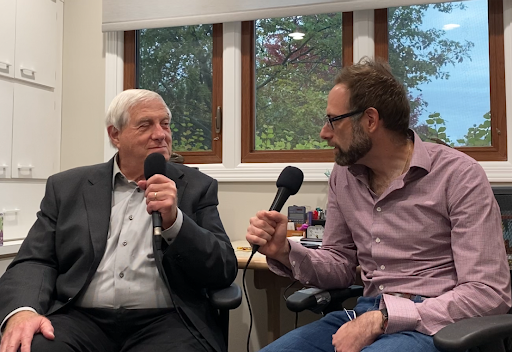Today is a special occasion. It is the 100th episode of Swarfcast
A lot has happened in our lives since the podcast began two and half years ago, and today we are going to look back at how the show reflected the world as it evolved.
Scroll down to listen to the podcast. Or listen on your phone with Google Podcasts, Apple Podcasts or your favorite app.

Main Points
Noah talks about the podcast’s second episode, recorded in April of 2018, in which he interviewed Miles Free, Director of Industry Affairs of the Precision Machined Products Association (PMPA). He plays a clip in which Miles discusses how tariffs on metals punish American factory workers and consumers. He also talks about a Chinese law (at the time of the interview) that said any foreign company in China is required to have a Chinese partner that has full access to the company’s technology. Miles says China was relaxing this law for foreign car companies. (3:00)
Noah shares thoughts about Episode 86, in which he interviewed Mike Micklewright, Director of the Kaizen Institute. Mike enthusiastically says that reshoring is happening, but he would not provide specific examples. Lloyd says he keeps hearing about the reshoring trend from machining business owners who are quoting jobs against China, but he has yet to see much proof of it actually happening yet (See Clip Below). (5:45)
Lloyd says that tariffs didn’t result in the immediate return of work from China, but they planted the seed for companies to analyze their relationships with Chinese suppliers. He says the pandemic dramatically changed how American businesses see working with China because it made the supply chain much less reliable. (7:15)
Noah plays a clip from Episode 72 with Daniel Hearsch, Managing Director at Alex Partners, a global supply chain expert. Daniel gave his best and worst case predictions for the impact of COVID-19 on the manufacturing economy. Back in late February when the interview was recorded, Daniel felt in a best case scenario American businesses would feel pressure for 4-5 months, with the stock market also taking a hit and the government providing some intervention. However, he also describes a worst case scenario, where people don’t take the threat seriously and the virus spreads, leading to further shut downs and slowing of business in the longer term. He seemed to be predicting more of the best case scenario in the interview. (8:50)
Lloyd discusses his feelings about doing business internationally in 2020. He describes it as being incredibly difficult due to travel restrictions, even between the US and Canada. Noah relates that Graff-Pinkert has had several deals fall through because it is so difficult to cross the border to inspect machines. (11:30)
Lloyd provides a counterpoint, saying that Graff-Pinkert also sold several Davenports screw machines to Chinese companies who were in a rush to receive them. He says that the fear of deteriorating international relations may have contributed to their sense of urgency. (12:20)
Lloyd says that for him, one of the most interesting guests on Swarfcast was Aneesa Muthana, owner of Pioneer Service Inc. a CNC shop near Chicago. (Episode 33). Aneesa provided a unique viewpoint as a Muslim woman in the machining business. We play a clip where Aneesa talks about diversity in her company and how she selects the most qualified candidates instead of placing limitations on herself and her business. She says she tries to make the environment of her company a welcoming environment for a diverse workforce, which has helped her employees thrive. (12:50)
Lloyd and Noah expand on the topic of diversity and how the podcast has not been as diverse as they would have liked. They wonder whether this might be a reflection of the machining industry itself. Noah shares that regrettably few women and African American guests have appeared on Swarfcast. He suggests it is something that the podcast may try to rectify in upcoming episodes. Lloyd shares his impression that the inclusion of women in machining is more of a concern to machining business owners than the inclusion of ethnic or racial minorities. (15:30)
Noah describes his process for selecting guests for the podcast. He says he looks for people with interesting stories who have something valuable to teach the podcast’s audience. Lately, Noah says he has looked at how the show’s content can provide practical benefit to listeners. He talks about a recent episode with Mike Campo of Firetrace, which addresses how to prevent machine fires (Episode 98). (17:30)
Noah talks about another one of his favorite interviews from Episode 80 and Episode 81, with Chris Voss and Brandon Voss. Chris, a former FBI hostage negotiator, and his son Brandon, apply hostage negotiation techniques to the business world. In the clip, Chris says that part of a successful deal is making sure a counterpart feels as if they have made a great deal. He says it’s important to play the long game with negotiation, to keep customers coming back. (18:15)
Noah plays a clip from another one of his favorite interviews, Ari Meisel. Ari calls himself an “Overwhelmologist.” He talks about time management and automating one’s business as well as other parts of one’s life. Ari talks about how he distinguishes “owning a business” versus “owning a job.” Ari feels every business owner should strive to be replaceable. He says business owners run a businesses with their ideas, not their hands. (20:10)
Lloyd says he learned a lot from this particular episode and from working with Noah, who attempts to use a few of the principals Ari describes. Lloyd says that he respects Noah’s discipline when enforcing a work-life balance. (23:00)
Noah talks about some of the recent changes to the podcast. He has started making seasons with specific themes. Also he now asks the same question to every guest about what they learned last week. (23:50)
Noah asks Lloyd what he learned in the last week. Lloyd says he has learned (or relearned) that people actually want to connect with him. The day before he and Noah recorded the podcast he reconnected with someone from a men’s group who he had not spoken to in over a decade. Lloyd also received a phone call from someone who read a recent Swarfblog Lloyd wrote on aging. He had never met this person but was pleased and astonished to learn how his words had resonated with the man. (24:45)
Noah says that one of the reasons he enjoys recording Swarfcast is that it might make a little difference in someone’s life. He feels if the show can entertain or teach listeners something new he has made a small impact on the world.
Question: What’s your favorite episode of Swarfcast?
Podcast: Play in new window | Download


3 Comments
Is that really me in the photo? I didn’t think I looked that old.
They are all like my children! But of course I am a big fan of the interview with Chris and Brandon Voss. Ari Meisel as well. Two people who have had an important impact on my life!
Congratulations on the Big 100! The Ari Meisel interview was one of my favorites, and parts of it still stick with me.